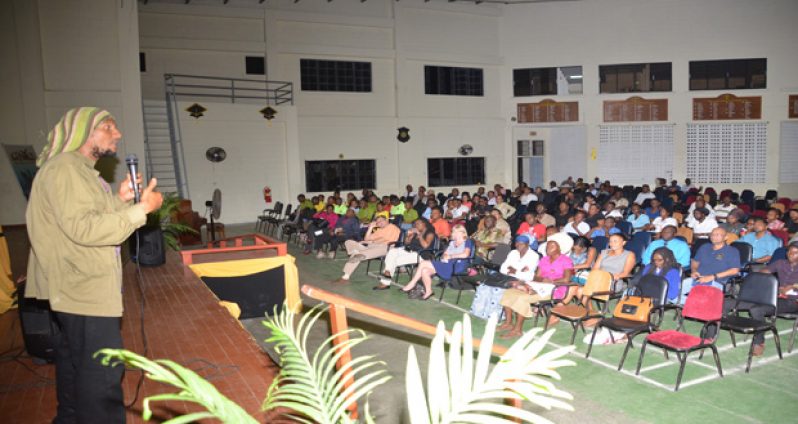UNDER the theme: ‘Rethinking Community Development; A Social Enterprise Approach,’ the issue of wealth-creation through enterprise which generates employment was related to youths attending a public lecture under the umbrella of the office of the Presidential Adviser on Youth Empowerment in collaboration with the Guyana National Youth Council (GNYC).The event was held yesterday at the Queen’s College Auditorium. According to Presidential Adviser on Youth Empowerment Aubrey Norton, social enterprises can play a key part in the solution. Young people can benefit from enterprises that can build their skills and confidence; that can create and keep wealth in “our most deprived communities, and that can build trust and responsibility, provide role models, reward hard work and give young people a voice and a stake in their own development.”
The feature presentation was delivered by Dr. K’adamawe K’nife – Lecturer/Researcher at the University of the West Indies. In his lecture, Dr. K’nife explored how social enterprises can contribute to community development with a focus on youth development, gender mainstreaming and sustainable development. High youth unemployment plagues the Region; in the case of Guyana as high as 40 percent.
According to the lecturer, economic and community development are not separate, but one unit since development is change in the capacity to act and innovate using the movement from economic growth to economic development. He noted that the main objective of community development is working to make people aware of the various problems facing the community. Cures for the various problems would include: educational activities, recreational, entrepreneurial employment and healthy living which will eventually open opportunities for better living standards.
Emphasising that patriotism should be also encompassed in love and national unity, the lecturer disclosed that only as a unit, communities will benefit from true development, since this gives a hand to government in promoting development and growth within a country.
He underscored that as community developers have long recognised, the problems that contribute to poverty are very much inter-connected. While poverty cannot be explained as merely a consequence of housing, education, and health, each poses unique challenges to low-income families at the community level, and none can be understood independently of one another.
To take the innovative solutions developed at the neighbourhood level across the entire country, there are fundamental principles: use a clear set of measurable results. Successful community development requires a focus on a clear set of measurable results for children, families, and communities.
Adding that there is need to use existing resources more efficiently and effectively, the UWI lecturer explained that citizens must closely examine what works, being willing to challenge existing orthodoxy. That requires a re-invigorated research agenda that evaluates programmes rigorously and provides evidence to facilitate continuous improvement.
Alluding to the fact that focus should be placed on people and places, he said in order to address barriers that arise from individual life circumstances as well as neighbourhood and regional environments, efforts must be both people-based and place-based. This work must be centred on people-based policies and programmes that increase economic mobility and break inter-generational cycles of poverty, including macro-level policies that ensure future economic growth is accompanied by real increases in wages and median incomes, as well as micro-level policies to support healthy child development, academic success, skills development, economic stability, geographic mobility, and work. They also must promote responsibility, to emphasise the importance of graduating from high school, making responsible parenting choices, and seeking and maintaining full-time work. And they must incorporate place-based access to opportunity, and counteract the place effects of concentrated poverty.
Youths should focus on enterprise to develop communities – UWI lecturer
SHARE THIS ARTICLE :
Facebook
Twitter
WhatsApp



.jpg)








